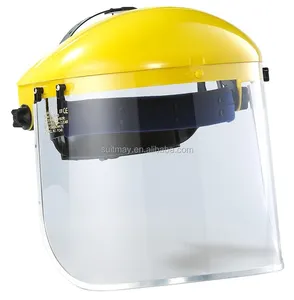(3431 products available)












































































































































































































This face shield shields the area and are usually used in medical personnel and workshops, among other applications. They provide good visibility while protecting against impact and chemical splashes.
This mask incorporates a shield to cover the face, including wearers' eyes and faces, such as splashes, dust, and other particles. It is mostly used in the medical field, construction, and any work requiring safety eyewear.
This eyewear combines style and security as it incorporates a face shield for a trendy look in urban areas. The polycarbonate materials used have excellent optical qualities and mechanical strength, enhancing safety and providing good vision.
These shields are designed for paintball enthusiasts, shield wearers from paintballs and other elements in the field. They feature impact-resistant polycarbonate, providing a clear line of vision.
A polycarbonate windshield is a lighter and more impact-resistant alternative to glass used in various vehicles, including recreational vehicles (RVs) and boats. Their high resistance to weathering and toughness makes them good protectors for outdoor applications.
Polycarbonate shields are widely used in the medical field, primarily face shields for doctors and nurses to wear during medical procedures. This helps protect the body from splashes, and because the shields are made with polycarbonate materials, they provide clarity and minimal weight, allowing the users to work comfortably and not hinder their vision.
In construction areas and outdoor workplaces, polycarbonate shield mask is used to protect workers from flying debris, dust, and other potential hazards. They are lightweight and have great impact resistance and clarity for good vision in hazardous work environments.
Polycarbonate face shields are common in manufacturing due to their great resistance to chemicals and impacts. It can also be used in processing centers where hot materials and sharp tools are handled.
Polycarbonate paintball shields are majorly utilized in protective gear for paintball players, helping to minimize impacts from paintballs and other factors in the gameplay. It is great to see something lightweight that provides good clarity and still creates a level of impact for something - especially during fast TV games, which are played in different environments.
Emergency workers use polycarbonate face shields to protect themselves from biological and chemical agents when responding to hazardous material spills and rescue operations. They are comfortable, protective, and allow easy vision, making them an excellent option for people in hazardous occupations.
In scientific research facilities, polycarbonate shields are often used to protect laboratory personnel from splashes of toxic substances, lasers, and other potential hazards. Lab workers select high optical clarity, chemical resistance, and durability in their lab equipment.
Polycarbonate shield glasses are often worn and used as stylish eyewear to fit in and enhance safety by preventing injuries to the eyes and face. Due to their light weight and strength, they can be worn daily as an accessory and as a safety equipment.
The installation of polycarbonate shields depends on a specific application. For instance, face shields are usually worn on a helmet or headpiece where the shield can easily drop down to protect the face. Windshields, on the other hand, are fitted into vehicle frames and sealed with glue or other fastening methods. Most polycarbonate shields, irrespective of the application, can be readily cut into desired sizes and shapes, bent using heat, and mounted onto frames or supports using adhesives, screws, or clips, making the installation process easier and more versatile.
A1: Polycarbonate shields are protective devices made from polycarbonate, high-impact, and optical clarity transparent material. They can be used to protect against hazardous elements such as flying debris, UV rays, chemical exposure, and ballistics.
A2: Polycarbonate is chosen due to its high impact resistance, lightweight nature, optical clarity, and UV protection. These features make it suitable for various applications, from protective eyewear to windshields.
A3: Polycarbonate shields are scratch-resistant, most of the time, due to a hard coating applied to the surface. This helps protect the shield from minor abrasions and damage.
A4: Polycarbonate shields should be cleaned with a soft, microfiber cloth and lukewarm water with mild soap. Avoid abrasive materials and chemicals containing ammonia, bleach, or harsh solvents.
A5: The shield should be replaced when there are visible scratches, cracks, dents, or yellowing due to UV exposure. Polycarbonate shields usually last about 3 to 5 years, depending on usage conditions.
A6: Yes, most polycarbonate shields protect up to 99% of UV rays. This makes them ideal for outdoor use, as they help protect the skin and eyes from long-term damage.
A7: Yes, polycarbonate shields are commonly used in sports applications, like paintball and safety goggles, due to their high impact resistance and durability.
A8: The installation method depends on the application. Face shields generally attach to helmets or headgear, while windshields are fitted to vehicle frames using adhesives or fasteners.